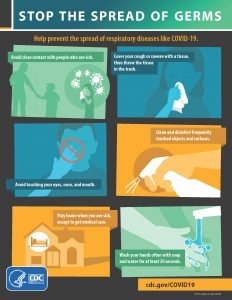Learn more about COVID-19. Those seeking help with COVID-19 vaccination appointments should contact their local Department of Public Health.
You’ve likely heard the news: it’s no longer a matter of if we should expect a metro Atlanta outbreak of the disease caused by the new coronavirus, but when.
Actions You Should Take Now
While numbers of those infected with the new coronavirus, known as COVID-19, in the United States are still fairly low as of this publication date, health officials are suggesting that certain groups that they consider “high risk”— adults over 65, as well as those with heart disease, lung disease, and diabetes—take certain actions now.
“Right now, especially, individual actions can have an important impact on how this situation plays out,” the CDC’s Nancy Messionnier told AARP in a recent article.
Click here for up-to-date, point-by-point information from the Centers for Disease Control and Prevention (CDC).

Among those recommended actions, the CDC strongly suggests that individuals…
- Get vaccinated if you are eligible.
- Wear a mask when in public.
- Have extra medications, food, and other essentials on hand in case you need to stay home.
- Reduce possible exposure to the virus by teleworking, avoiding large public gatherings, and reconsidering travel plans that put you at risk of contracting the illness—such as cruises.
- Stay home during a COVID-19 outbreak in your community.
See the CDC’s full list of updated recommendations.
On Enjoying Your Solitude During a Quarantine
So what are you to do with yourself while staying home, either to avoid getting sick or while recovering? That’s the topic of a recent piece in Next Avenue written by an older man who’s chosen to play it safe during the new coronavirus outbreak by isolating himself while getting over a minor cold. He writes:
“I am staying away from malls and other crowded places. I am no longer checking books out of the public library because I’m uneasy about such volumes having passed through so many other hands. I’ve begged off all social engagements — again, because of that unidentified bug, and also because some friends are also ill. (Most in my social circle are introverts who treasure solitude, so cancelled plans are a good thing.)”
The post looks beyond basic steps like stocking up on food, meds, and cleaning supplies, to considering the comfort of your home office (which you may be teleworking from), your exercise and entertainment options, and whether buying those medical masks we’re seeing more and more of are really worth it. (Hint: Not really if you’re not actually sick.)
Remember: it’s always a idea good to have a plan in place in case of the unexpected.
Empowerline has resources that can help you and your loved ones prepare for your future, from financial planning tips to a disaster planning toolkit. You may also want to consider an emergency response system or assistive technology to help you contact others in an emergency situation.


